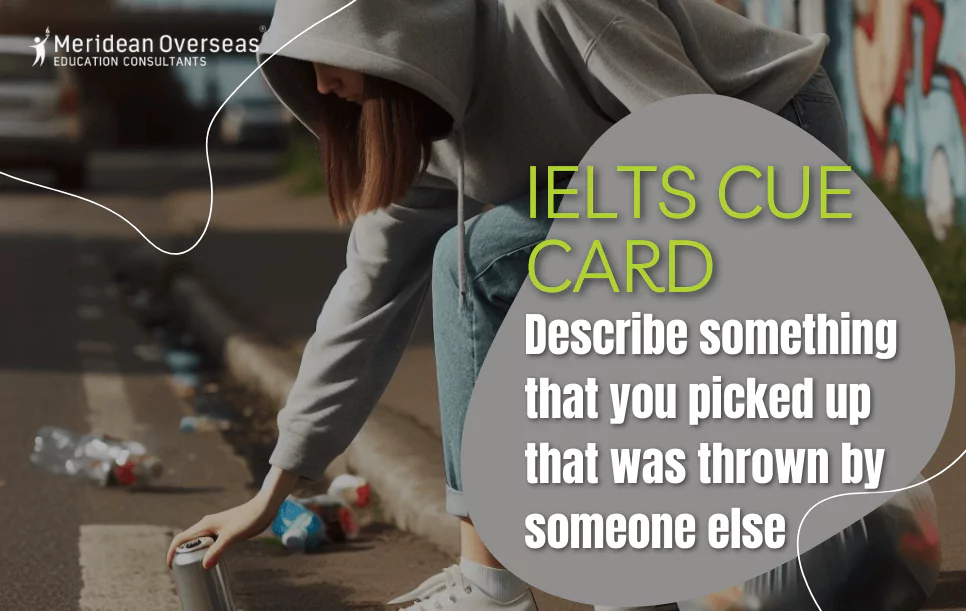
Announcements

Announcements

Meridean Overseas
Updated On 16 April 2024 & Read Time 9 minutes
4.3k
One of the main concerns among students who need assistance preparing for the IELTS exam is how to perform well in the Speaking section. IELTS Speaking is identical for both Academic and General Training and is an informally conducted face-to-face conversation with an IELTS examiner.
Speaking, listening, writing, and reading are the four sections of the IELTS exam, and you only have two and a half hours to complete them, so you must give time to each portion. The speaking section has a fifteen-minute time limit. Much practice is required to cover what you wish to do in 11–14 minutes.
However, you need to know it is more challenging than you think. Various topics offer no content, like “Describe something that you picked up that was thrown by someone else” in one CUE Card topic we will cover today. So, it's time to begin this blog.
Table of Contents
As I strolled along the beach, I noticed something shining through the sand. Bending over, I found a rumpled Coke can that someone had carelessly thrown away. After seeing it, I felt a mixture of sadness and resolve because I knew that everything we do matters in protecting our fragile ecosystem.

This incident happened on a calm beach, where soft waves lapped onto the shore, providing a lovely setting for the thoughtless littering. Everyone is drawn to the beach because of its breathtaking beauty at dusk and dawn.
I discovered the forgotten object while taking a leisurely walk on the beach. As soon as I saw it in the sand, I felt compelled to make amends for my careless deed. I picked up the Coke can that had fallen on the beachwalking route.
After picking it up, I took care to dispose of the Coke properly in a neighbouring recycling container. This way, I can help minimise waste and lessen its influence on the environment by ensuring that the materials can be reused.
After discarding the Coke cans correctly, I felt responsible and satisfied. I felt happy and fulfilled knowing I had made a tiny but essential contribution to environmental preservation. This strengthened my resolve to pay attention to my surroundings and take action to save the environment for the coming generations.
In conclusion, I was delighted after trying to gather up and dispose of the abandoned drink can. It made me realise how crucial each person's efforts are to protecting the ecosystem. Since every little action toward sustainability advances a more significant cause, I am inspired to keep doing my share to protect the environment.
Also, Read: Describe a person who always has interesting ideas or opinions
I was walking through a thick woodland when I noticed something shining bright in the undergrowth. I looked inside and saw a crumpled candy wrapper left on the forest floor. s.
This happened in the middle of a thick forest while trekking in the backcountry.
Out of a sense of duty and consideration for the environment, I gathered the candy wrappers that had been thrown away. Littering damages wildlife, disrupts ecosystems, and lessens the natural beauty of our surroundings.
Throwing rappers or any other waste material damages ecosystems, puts animals in danger, and lessens the beauty of the natural world around us. By picking up the wrappers, I tried to reduce the harm that human activity was causing to the fragile balance of the forest ecosystem.
After appropriately disposing of the candy wrappers, I felt content and fulfilled. I felt at ease, like I had accomplished something worthwhile, when I realised I had made a tiny difference in the atmosphere. This realisation strengthened my conviction that we must care for the environment and motivated me to keep pushing for environmental protection measures.
In summary, gathering the abandoned candy wrappers in the forest reminded me of how closely human behavior and the environment are related. Removing the wrappers and ensuring they were disposed of adequately demonstrated that I was still committed to protecting the environment.
Also, Read: Describe a beautiful city - IELTS cue card
Embark and excel in your study abroad journey with our expert team!

As I strolled about the neighbourhood, I saw a broken flower pot that had been handled carelessly. Its once-bright blossoms lay among broken pottery pieces, a sad reminder of someone's carelessness. Feeling a sense of healing, I started collecting the shattered fragments, each serving as a reminder of the need for awareness. I carefully preserved everything I could, thinking of the pot's revival as a refuge for fresh life. I decided to cultivate what others had abandoned and became a custodian of beauty at that moment.
The broken flower pot lay in the middle of the abandoned neighbourhood path. My attempt to save and rehabilitate what had been destroyed was prompted by the reminder that shared areas require care provided by their dispersed remnants.
The flower pot was picked up soon after being found in the neighbourhood because I was so moved to restore the public area when I saw the broken pot among the pathway.
After scooping up the broken flower pot, I carefully gathered and disposed of the broken parts. I then made sure everything was tidy and safe by cleaning the surroundings. I planned to replace the pot with a new one and plant new flowers since I was determined to bring beauty back to the area.
Resolved to restore the neighbourhood's beauty, I felt a mixture of sadness at the devastation caused by negligence and resolve as I picked up the broken flower pot and cleaned the surrounding area. I felt pride and responsibility for improving the community when I took action.
In conclusion, seeing the broken flower pot in the neighbourhood made me realise how much I needed to take care of the area and how determined I was to make it beautiful again. Even if the negligence that caused its downfall was painful, improving the community made me feel proud and fulfilled.
Also, Read: Describe a useful object in your home that you can’t live without
1. Do you think picking up the waste material thrown by someone else can help create a healthy environment?
It is possible to create a positive atmosphere even with a modest action, like picking up something someone else has thrown. People have the power to spread kindness and optimism by reacting favourably to circumstances, which will ultimately improve the mood.
2. Do you think that picking things is important?
Picking up objects is significant in Indian culture because it embodies hygiene principles and accountability. People make public areas cleaner and more hygienic for everyone by keeping them free of rubbish. Furthermore, picking up after others shows regard for public places and consideration for others, promoting a sense of civic duty and pride.
3. Do people consciously throw things?
In India, some people purposefully toss objects to express themselves or to protest against social or political issues. Such acts might be classified as activism or advocacy because they ignite conversations and increase awareness of pertinent problems. Furthermore, deliberate object tossing during festivals or celebrations can be a component of cultural customs, bringing energy and excitement to social events.
4. Have you been in a similar situation?
Yes, I remember when we were assigned to pick up trash along a nearby riverbank as part of a community cleanup campaign. Even though we were reluctant at first, our group soon joined in, and as we cleaned up the debris, we saw that the environment had improved. The cleanup effort improved the neighbourhood's aesthetics and gave members a sense of community and accountability.
Also, Read: Describe a piece of clothing you wear often - IELTS cue card
Boost your IELTS score with effective practice using these sample papers.
Get Your Free Guide
The speaking element has the same weight as the other sections despite having a 15-minute time limit. You will, therefore, need to practise a lot to handle this area. There are open-ended questions in this area, like "Describe something that you picked up that was thrown by someone else." To answer this, you must address the following four essential questions: "Where was it?" and "When was it picked up?" “What did you do after you picked it up?” “How did you feel?” Once you've addressed these, the examiner will ask you a few follow-up questions. Make the most of your time and respond appropriately and assuredly.
We hope you know how to cue card questions in your IELTS speaking test. But, if you want to get further details or would like to prepare for IELTS, you can contact our expert counsellors at Meridean Overseas Education Consultants (MOEC). You can also take free online counselling through our website. Our expert counsellors will provide you with the best support and guidance you need for admission and visa. In addition, they will help you shortlist the universities according to your profile. For more information or any queries, contact application02@meridean.org or 1800-1230-00011.

Contact MOEC Experts for Study Abroad Guidance!
By using our site, you agree to our use of cookies.

Hurry up before admissions close.

Contact MOEC Experts for Study Abroad Guidance!
